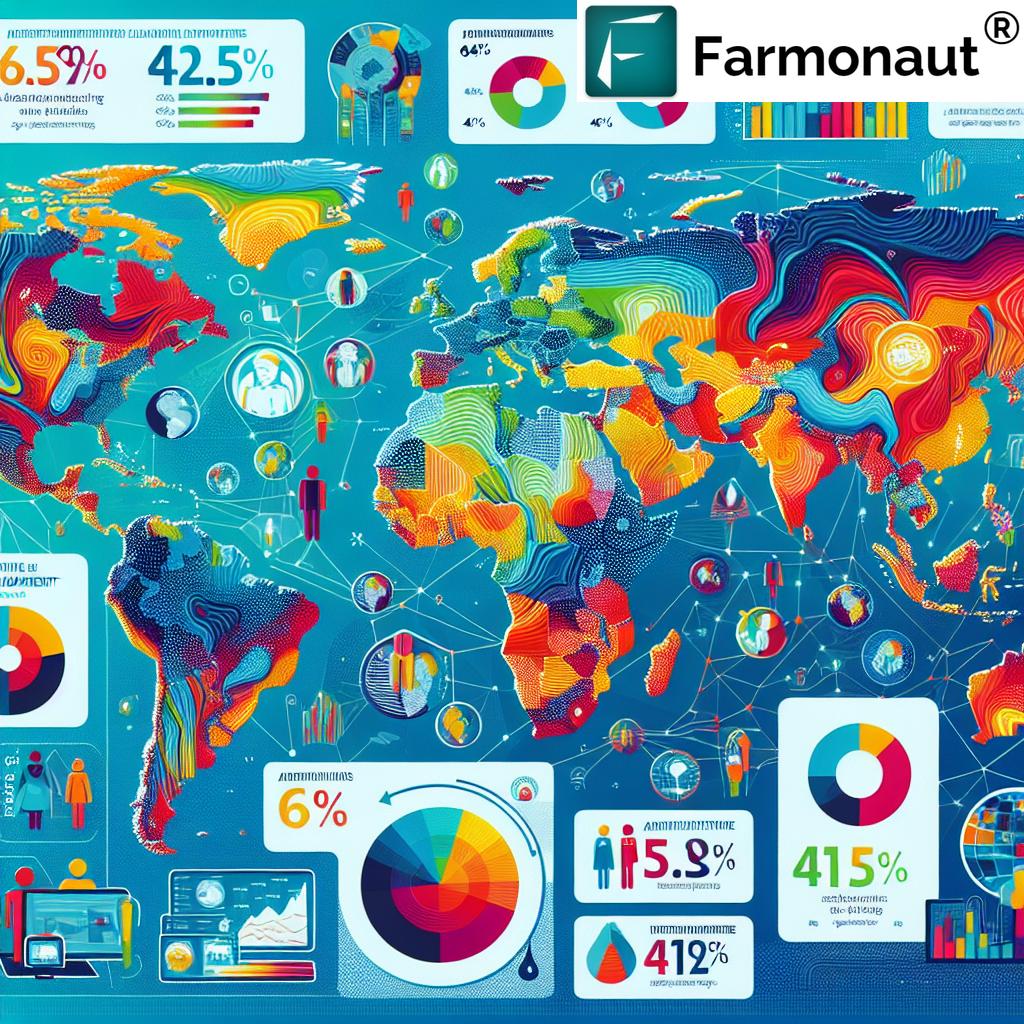Revolutionizing Global Grain Trade: BRICS Unveils Ambitious Exchange Plan to Challenge Western Dominance
In a bold move set to reshape the landscape of international agricultural trade, the BRICS nations have announced an ambitious plan to establish a new BRICS grain exchange. This initiative, spearheaded by Russia, aims to challenge the long-standing Western dominance in global commodity trading and marks a significant step towards de-dollarization in trade.

The BRICS Grain Exchange Initiative: A Game-Changer in the Making
The proposal for a new international grain exchange, unveiled at the recent BRICS summit in Kazan, Russia, has been met with enthusiasm from member countries. This BRICS economic initiative in agriculture is part of a broader strategy to create new financial instruments and reduce dependence on the U.S. dollar in international trade.
Russian President Vladimir Putin emphasized the potential of this exchange, highlighting that BRICS countries are among the world’s largest producers of grains, legumes, and oilseeds. The plan envisions expanding the exchange to trade other major commodities in the future, potentially revolutionizing the agricultural commodities market.
- The initiative aims to create a new platform for global wheat exports
- It’s part of Russia’s international commodity trading plans
- The exchange could lead to significant global wheat export market shifts
For those interested in leveraging technology for agricultural insights, consider exploring Farmonaut’s satellite-based solutions:
BRICS Agricultural Cooperation: A New Era of Collaboration
The approval of the grain exchange plan by BRICS leaders signifies a new level of BRICS agricultural cooperation. The communique from the summit not only welcomed Russia’s proposal but also supported ideas to expand it to other agricultural sectors. This move underscores the group’s commitment to strengthening economic ties and enhancing food security among member nations.
Eduard Zernin, head of the Grain Exporters Union, whose members export 80% of Russian grain, provided insights into the timeline and challenges of establishing such an exchange:
“Based on the experience of creating the BRICS’ New Development Bank, launching the joint exchange would require years of preparatory work. The proposed new exchange should have international status to protect it from potential Western sanctions.”
For developers interested in integrating agricultural data into their applications, Farmonaut offers robust API solutions:
Russian Grain Export Policies: Shaping the Future of Trade
Russia, as the world’s largest wheat exporter, has been actively working to develop its own commodity pricing mechanisms. This effort has gained urgency following recent declines in global grain prices. The Russian government has taken steps to protect its interests in the global grain trade:
- Informal agreements with leading exporters to avoid selling Russian grain to sovereign buyers through intermediaries
- Recommendations to exporters not to sell wheat below $250 per metric ton, significantly above current market rates
These Russian grain export policies are likely to play a crucial role in shaping the proposed BRICS grain exchange and its operational mechanisms.

Challenges and Opportunities: Navigating the Path Forward
While the BRICS grain exchange initiative presents exciting possibilities, it also faces significant challenges. Industry analysts have raised questions about the immediate need for a new grain trading platform, given the efficiency of existing international exchanges.
Yaroslav Lissovolik, head of the BRICS+ Analytics think tank, noted:
“Due to the advantages that established exchanges have in terms of customers, infrastructure, track record, and liquidity, it will take some time for the new exchange to catch up.”
Alexander Belozertsev, head of Alexandra Inc consultancy, pointed out that other BRICS members already have well-established commodity trading platforms:
“Strategically and technologically, all these exchanges have significantly advanced in trading agricultural derivatives compared to their Russian competitors. Do they really need the implementation of Russia’s initiative under the BRICS umbrella?”
Despite these challenges, the potential benefits of a BRICS-led grain exchange are significant:
- Enhanced price discovery mechanisms for agricultural commodities
- Reduced dependency on Western-dominated exchanges
- Greater control over global grain pricing mechanisms
- Facilitation of trade in local currencies, supporting de-dollarization efforts
The Road Ahead: Implications for Global Agriculture
The establishment of a BRICS grain exchange could have far-reaching implications for the global agricultural sector:
- Shift in power dynamics within international agricultural trade platforms
- Potential changes in global grain supply chains
- New opportunities for emerging markets in the agricultural sector
- Increased competition and innovation in commodity trading technologies
As the BRICS nations move forward with this ambitious plan, the global agricultural community will be watching closely. The success of this initiative could pave the way for more BRICS economic initiatives in agriculture, potentially reshaping the landscape of international trade.
For farmers and agricultural professionals looking to leverage cutting-edge technology in their operations, Farmonaut offers mobile applications for both Android and iOS platforms:
Conclusion: A New Chapter in Global Grain Trade
The BRICS grain exchange initiative represents a bold step towards reshaping the global agricultural commodities market. While challenges remain, the potential for this exchange to alter the dynamics of international grain trade is significant. As preparations begin and discussions continue, the agricultural world will be watching closely to see how this ambitious plan unfolds.
The success of this initiative could mark the beginning of a new era in global grain trade, one where emerging economies play a more central role in shaping market dynamics and pricing mechanisms. As the BRICS nations work towards realizing this vision, the implications for farmers, traders, and consumers worldwide could be profound.
Stay tuned for further developments on this groundbreaking initiative that promises to revolutionize the way we think about and conduct global grain trade.
















